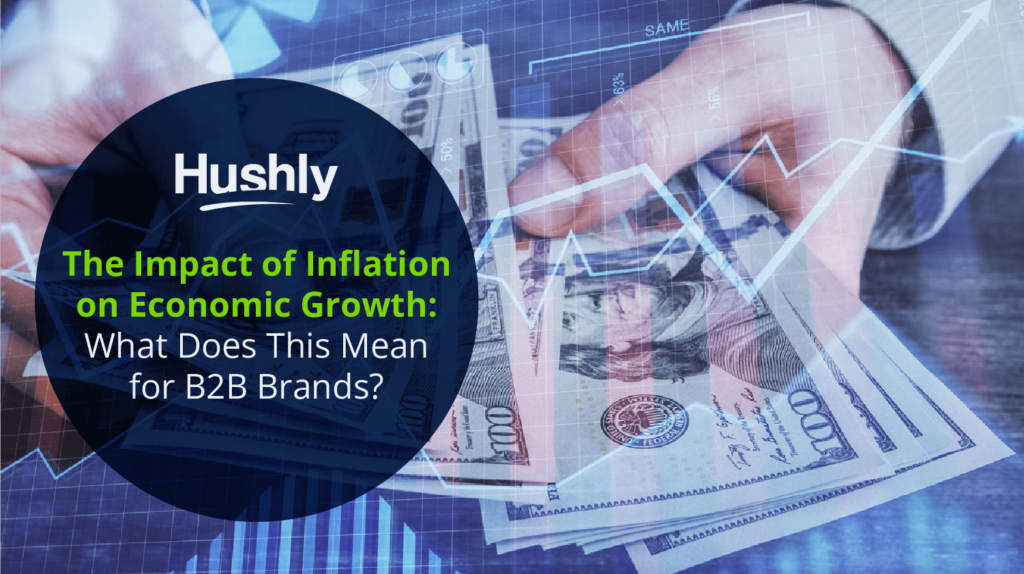Inflation is a hot topic these days. You may have seen it mentioned on the news or social media, or perhaps you’ve overheard conversations at work. With prices skyrocketing, it seems to be all anyone is talking about. For the average person, this means they’re shelling out more on everyday items, whether at the store or the pump. And it’s causing a lot of stress.
But what does it mean for B2B companies like yours? Is paying more for supplies, tools, etc. the only thing you need to worry about? Or are there other ways inflation can take its toll?
In this article, we’ll discuss what inflation is and look at the impact of inflation on economic growth. By understanding what’s going on in the world and how everything around us is directly impacted by inflation, we can be better prepared for what’s to come soon.

The Impact of Inflation on Economic Growth
Before we go any further, we need to first talk about what inflation is. Many people hear that word and have a general idea of what it means, but few fully understand the concept of inflation.
Well, inflation is the sustained increase in the price of goods and services that are available in an economy. The main drivers of inflation are the supply and demand for those aforementioned goods and services. Demand will outpace the available supply, which causes prices to increase.
We’re partly dealing with this as a result of the shutdowns caused by the COVID-19 pandemic. When manufacturers had to close their plants or scale back on production, it hurt the supply chain. Now, as the world has reopened, many are scrambling to return to the production levels they were once at.
When it comes to the impact of inflation on economic growth, the only concern isn’t that everyday items become more expensive. With costs increasing, it reduces the purchasing power of consumers. That’s because they become unable to afford the same level of goods and services they did before. It can also lead to higher interest rates, as the cost of borrowing money increases.
Although inflation creates a lot of challenges, it’s important to remember there’s always a light at the end of the tunnel. Some experts believe there are positive effects of inflation, feeling it can ultimately help drive the economy forward. Only time will tell how things turn out for the U.S. this time around.
4 Impacts of Inflation on B2B Companies
Now the question is, how does inflation affect businesses? The obstacles it presents for you will likely be different from how it impacts the average person. But by familiarizing yourself with any potential challenges, you can begin preparing for them now, so it’ll be easier to deal with when the time comes. Here’s what you should be aware of moving forward:
1. Running a Business Has Become More Costly
It should come as no surprise that rising costs have made it more expensive to run a business. While the impact of inflation on economic growth increases the prices of everyday items, it also creates new challenges for businesses. You’ll likely find yourself spending more on daily operations with the costs of your usual supplies and tools skyrocketing. If you have a physical location, even rent may have increased.
Not only that, but The Great Resignation has led employees across the country to leave their jobs in search of higher pay. With life becoming more expensive, we could continue to see this happen. As a B2B company, you’ll either be forced to adjust salaries, or you’ll wind up spending more time in the hiring phase as you work to replace any employees who choose to resign.
To combat this, take some time to review your monthly expenses. Is there anything you can cut out to save money? Are there any changes you can make in favor of more affordable options? And finally, talk to your employees about their inflation concerns. Make sure they’re happy and show them you value their hard work, so they’ll be more inclined to stick around.
2. Marketing Budgets Are Shifting Across the Board
If you’re reconsidering your marketing budget right now, you aren’t alone. The COVID-19 pandemic prompted some B2B companies to shift how they were spending their marketing dollars. Initially, research featuring 450 companies showed that many would keep their budgets relatively the same despite the ongoing pandemic. 72% of B2B marketing budgets would increase, stay the same, or decrease moderately. Those planning to decrease their budget said it would only be by 20% or less.
However, one month after that study was conducted, McKinsey & Company asked the same question. They surveyed over 3,700 companies across 11 countries. At this point, 62% of those global brands surveyed had already reduced their marketing budgets. In the U.S., only 57% scaled back.
So, with the state of the economy, could it be worth adapting your marketing strategy? Perhaps! Inflation is prompting many businesses to cut back on or eliminate certain expenses. While you don’t want to forgo your marketing budget entirely, you could temporarily scale back to save money. Or you could ramp up spending to drive more leads in a time when sales are slow.
3. CEOs are Rethinking Their Pricing Strategy
With the cost of everything increasing, many consumers have become hesitant to make purchasing decisions. They’re afraid to spend money on anything but the absolute necessities. As a B2B company, this can’t be ignored. If you sit back and do nothing, your profit margins could greatly decrease.
Because of the impact of inflation on economic growth, many CEOs are now rethinking their pricing strategy. This could be worth looking at if you want to keep your business afloat. With people feeling hesitant to make purchases, could you lower your prices to ease their concerns? Or would it be better to increase your prices to accommodate for a decrease in buyers?
No matter what you decide, it’s a good time to consider the cost of your offerings. It’s also worthwhile to be completely transparent with potential consumers about why you price things the way you do. When they can see and understand your reasoning for the prices you set, they’ll see the value in what you offer and may be more inclined to purchase from you instead of a competitor.
4. Inflation Can Strengthen Your Brand Presence
During these challenging times, it’s the perfect opportunity to go back to the basics. Ask yourself if your B2B brand truly has a strong presence among consumers. Why? Well, brands that have already built a loyal community will be more inclined to stick around and support their favorite companies long-term, no matter what’s going on in the world.
If they love who you are and what you do, you won’t have to worry about them choosing you over a competitor. That’s because people are often unlikely to change their preferences. Prioritize content creation and engaging with your community to build strong relationships that will last for a long time, and you’ll be grateful well into the future.
Fight the Impact of Inflation on Economic Growth With a Strong Business Strategy
When your business has a firm foundation, you’ll have a better chance of withstanding just about anything that comes your way, even economic difficulties. Here at Hushly, we are committed to helping our clients succeed in business. We offer solutions for content marketing, customer engagement, and more. We’re here to help you attract potential leads and convert them into paying customers so your business can stay afloat.
Schedule a demo today so you can see Hushly in action.

